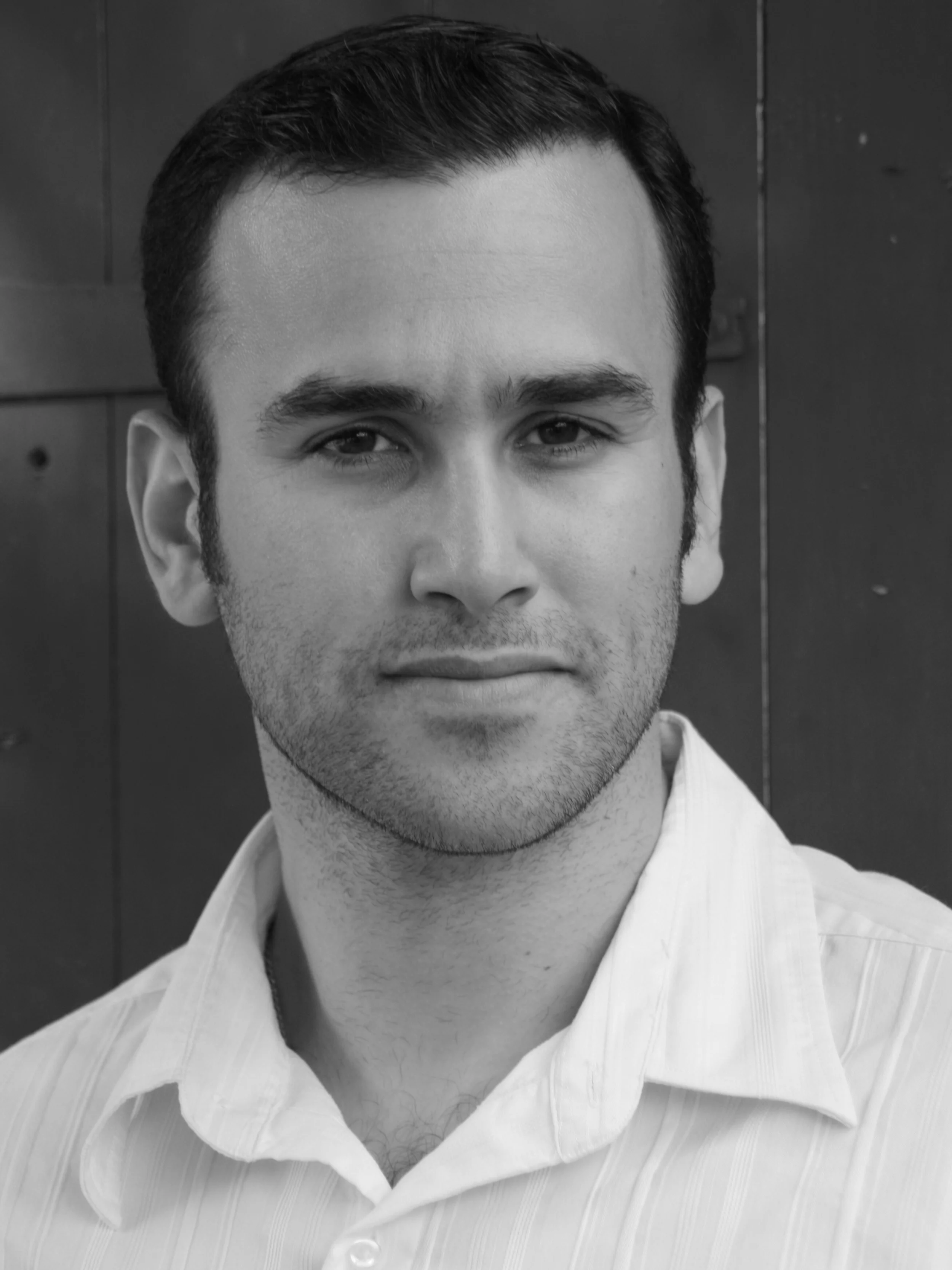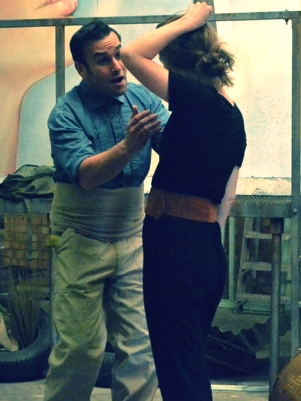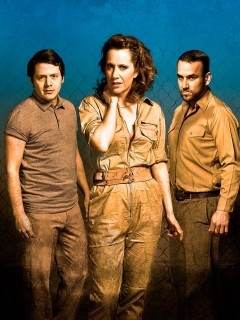Carmen Special PerformerUpClose interview with Anthony Flaum



Anthony Flaum, tenor
OperaUpClose performing credits include: Rodolfo La Bohème, and Octavius Don Giovanni
You have an interesting story about how you started singing for OperaUpClose, care to share?
It all began at a wedding celebration at Ronnie Scott's in Soho, late 2009. My wife and I got chatting to a guy who said that his boyfriend at the time was an opera producer. I was, until then, a musical theatre singer earning most of my money by working in finance but my wife encouraged me to give him my business card, which I dutifully did. I had previously dismissed opera as an unrealistic over-musical frippery. However the next thing I knew, I was auditioning for the role of Benoit in La Bohème on a cold November day for the OUC team in an archway studio in Brixton (where we recently revisited for Carmen rehearsals!).
At my audition, Robin with her foresight, advised me to look at the main tenor role of Rodolfo instead. After some vacillating on my behalf of whether to go down this road or not, I was suddenly baptised in 'operatic fire' - I had three weeks to learn the role, the blocking and a completely different style of singing to what I had trained in. I approached the show as I knew how to, through the text and the truth of the situation. So, I learnt the show and the blocking in time for opening night and though the singing has been a much longer process of improvement (and it should continue to be so for any singer), I loved the intimacy and grittiness of that production and OUC's approach to the piece, particularly in its original staging at The Cock Tavern Theatre in Kilburn. After that I was hooked!
You are currently in rehearsals for our production of Carmen, how's it been so far, any highlights?
It's been great. I'm mostly working with Flora McIntosh as my Carmen who I've had the pleasure of working with before. Robin has been instigating discussions and improvisation sessions on all the scenes before we stage them, which I feel, has engendered a real sense of truth in our acting. So I'm enjoying the creative process very much from that respect. A highlight has to be when we rehearsed the fight scenes and death sequence with our fight director, Roger Bartlett. By the look on Robin's face during some of that rehearsal, I think even she was alarmed at what the story and importantly, what her direction is going to present to our audience at Soho Theatre!
What are you most excited about with this production of Carmen?
Firstly, Robin's take on the direction of the piece; the truth, the grit, the dark nature of the world she has created. Everybody knows Carmen, but Robin has made sure we see the story under a different light. It is exactly because the opera is so often performed that I think Robin chose to take a slightly darker, more gritty angle. Importantly however, I don't feel that she has put a "spin" on the story but rather has really focused us all on the alarmingly dark core behind the action. She's an inspiring director to work with.
Secondly, I get to play the bad guy for once. I've been lucky enough to play some wonderful roles in my career so far, however more towards the romantic, lovable end of the scale. Don José (without giving too much away) is a dark, brooding and bullish character. Yet he has a kernel of morality in him, no matter how skewed that morality is by the time we meet him. I wouldn't necessarily invite him round to meet the family for a Sunday roast but he's not all bad. Like most of us, what has happened to him in the past has shaped his world and outlook upon it and although I'm keen for him to not be a "victim", by the time Act 1 is finished, he is having rather a bad day!
Broadening out, what's been the hightlight of your career as an opera singer so far?
Firstly it has to be that first run of La Bohème (OUC at the Cock Tavern Theatre) with the pickled Irish guys singing along in the corner and the passers by stopping to listen to Act 2 whilst munching on their kebabs. It had an innate bohemianism about it!
Secondly, singing Lensky in a beautiful production ofEugene Onegin (Grange Park Opera).
And thirdly, rehearsing and performing Les miserables with prisoners in HMP Erlestoke as part of one of Pimlico Opera's incredibly worthwhile prison projects.
What role are you dying to sing in the future?
I have to admit that I don't know enough about some areas of the operatic spectrum (e.g. post-Britten and contemporary opera). I'm quite fond of most of the classic 18th/19th/early 20th century tenor roles from the great composers such as Mozart, Puccini, Donizetti, Verdi, Gounod and a real favourite of mine, Tchaikovsky.
No matter how many times you perform the same role, you never quite get to do everything you want to with it. So I wouldn't mind returning to a few characters I've played before. I love the sheer lyricism and romanticism of roles like Alfredo or Romeo - they carry with them a more dramatic edge, be that tragedy or feistiness. I also like putting a stronger or more considered spin on some characters that have "traditionally" been played quite weakly/wet e.g. Tamino, Ottavio, Nemorino. I also have quite a penchant for poetic roles - Lensky, Werther, Rodolfo - poetic yet slightly tortured!
I'm a lyric tenor and realistic of what roles I should be singing in the bigger houses. That said, if my voice develops into a more dramatic instrument, then I would dearly love to tackle roles such as Otello, Peter Grimes or Hermann in Queen of Spades - these are really tortured, quite frantic souls. However, they are HUGE roles to sing and my voice might remain with the more lyric roles. I'm open to suggestions really!
What are your thoughts on singing in English?
English is my mother tongue. In my opinion, no matter how fluent you are with a foreign language, the meaning and context of the words will never be conveyed in your body language as well as they do in your mother tongue when singing. There is a huge range of colours one can layer onto the text if it's your mother tongue. I learnt Rodolfo, for example, first in English (in Robin's translation) and then in the original Italian. Usually, it is strongly advised that you do it the other way around to ensure you're musically and stylistically accurate. However, I found it really informed my singing of the original piece in a positive way and only served to bring out what was already there on the page. So I think it is important to sing roles in English - whether they're originally written in English or not. When it comes to translated roles, this really depends on the skill of the translator and their knowledge of both the original text and meaning, the musical phrasing of the composer and the physical workings of the various voice types in the piece. Let's not kid ourselves - English is not inherently as lyrical a language as Italian, French or Russian but if used well, it's a very descriptive, visceral yet clever language and can be very communicative emotionally as well as quite ambiguous in its meaning, which is useful in some dramatic situations.
Anything else you would like to share with our Friends and Patrons?
Only to stress how important companies such as OUC are in the fibre of contemporary British operatic tradition. I have grown as a performer over the past 5 years, as they have as a company. I could not have developed and achieved what I have achieved without the financial (and emotional!) support of some important people. With the current quite punitive squeeze on arts funding, I urge people to continue to support their most valid work.
Also, I hope people don't find my Don Jose too scary - I'm a nice guy, really!
Carmen is at Soho Theatre, 5 August - 19 September 2015
